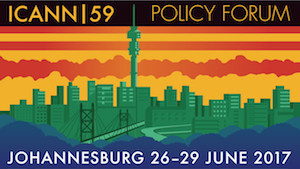GAC and ALAC meeting
10 Jul 2017 02:00h
Event report
The Government Advisory Committee (GAC) and the At-Large Advisory Committee (ALAC), two advisory committees in the Internet Corporation for Assigned Names and Numbers (ICANN) structure met during the ICANN59 meeting in Johannesburg, South Africa on 27 June 2017.
The main areas of focus were:
- Ways to make GAC/ALAC cooperation more concrete.
- New approaches to the new generic top-level domain (gTLD) procedures.
- Underserved regions.
Mr Thomas Schneider (Chair, GAC) chaired the session, with input from Mr Yrjö Länsipuro (ALAC liason to GAC), Mr Alan Greenberg (Chair, ALAC) and other GAC representatives and ALAC members.
Greenberg informed participants that ALAC always receives requests for collaborative projects between ALAC and GAC. He then invited GAC representation at the different At-Large conference calls and working groups, like that on the new gTLDs process, which had become defunct but needs to be reactivated. Schneider informed participants that even with the key barrier of time, GAC is willing to participate in different policy issues. A main concern raised by some GAC members is the numerous e-mails on mailing lists and so much information, making keeping up with discussions hard. Lansipuro then invited leads and members from both groups to suggest ideas to strengthen participation, especially during physical ICANN meetings.
Regarding gTLD procedures, Greenberg informed participants that ALAC was active in the Policy Development Process (PDP), on some occasions contributing to developing applicant guidebooks and giving pointed comments. He added that the new round of the PDP is a much more open process, so it might be difficult for more people to be active. Schneider commented that time and resources need to be dedicated so that there is significant participation.
On the issue of human rights, Mr Mark Carvell (UK representative on the GAC) introduced other co-chairs of the Human Rights and International Law (HRIL) working group: Ms Milagros Castañon (Peru) and Mr Jorge Cancio (Switzerland). The objectives of the group are to consider any appropriate steps that ICANN can take to ensure that its coordination of the domain name system (DNS) is managed in a manner which respects human rights and relevant international law, to cooperate with ICANN’s Advisory Committees (ACs), Supporting Organisations (SOs), and communities. He referred to the cross-community working group on ICANN’s corporate social responsibility to respect human rights, and participate in ICANN work steams, policies, and studies to promote a shared understanding of human rights and international law.
Generally, representatives from different countries and other attendees agreed that participating in the PDP was difficult for different groups/people but is an important step in developing Internet policy. Sometimes, inviting or calling for input in the later stages of policy development may make some participants feel they lack legitimacy, and therefore can hardly influence policy. One GAC representative reminded participants that ICANN employs a multistakeholder approach – this means different stakeholders participate fully in its roles and responsibilities. Participants asked to receive information in advance, and in a summarised format to allow full participation.
Related topics
Related event

